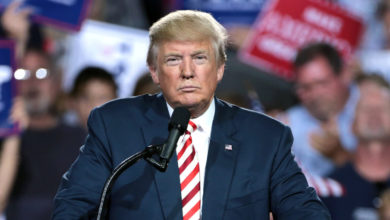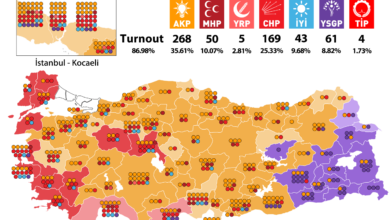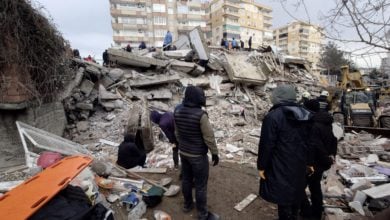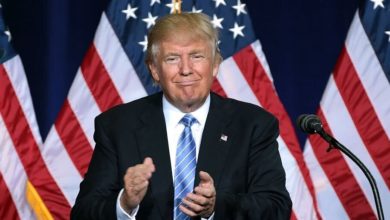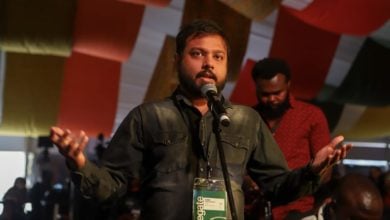Click here to read the latest Liberation News analysis on Turkey
This article Reposted from soL News
soL news interviewed Kemal Okuyan, the general secretary of the Communist Party of Turkey (TKP), on the results of June 24 election results. Okuyan reminded that the political power had organised electoral manipulations quite before the elections and that the TKP pointed this out strongly in those days. He highlights that Turkish President Recep Tayyip Erdoğan’s “success” should be evaluated starting right from this point. Okuyan also noted that the coalition of the opposition was designed as a “project of the capitalists”, and that the “pro-establishment left” quit adhering to leftist values since anti-establishment left moved away from these values.
Turkey’s Supreme Electoral Board (YSK) had unlawfully prevented TKP from entering June 24 elections and TKP undid this inhibition by running independent communist candidates in parliamentary elections through This Social Order Must Change Platform. The platform was established following the call of TKP. The platform ran a total of 17 independent candidates in different provinces of Turkey.
Erdoğan portrayed quite an incapacitated and disqualified image before June 24 elections. However, Erdoğan won the elections in the first round. What do you think had happened?
We have to talk about the electoral system first of all. Electoral manipulations are being set before the elections, not on the day of the elections, as we always say. We warned about electoral inks, unsealed envelopes and ballots, ballot box relocations and such before when we said: “no to elections under these circumstances”. The [parliamentary main opposition party, CHP] Republican People’s Party and others just let people put up with all that, saying “they cannot do anything”. And yet, the problem is not only related to the electoral system. The strategy of defeating the [ruling party] AKP by resembling the AKP itself also failed.
We will come back to this point again but I would like to resolve the issue of electoral frauds. What could have they done, really?
Apart from the things they did on the day of the election, the real issue rests on voter lists. The electoral turnout is quite high. I personally do not believe that the ratio of turnout is real. We know that people voted instead of the dead and the ones in abroad. Also multiple votes… We witnessed countless times that civil servants voted more than once with their officer IDs. More importantly, the system in Turkey makes it impossible to track down “virtual citizens”. They are in control of the ID system. The ballot boxes are a complete mess and no one can inspect; people living in the same apartment are registered in different ballot boxes. When you gather all that together, it makes something huge.
Doesn’t the opposition parties know about that?
Let’s call them pro-establishment opposition. They are responsible from the continuation of this damned system as much as the parties in power, and they act accordingly! They acted accordingly during the Gezi Park resistance, after the local elections in 2014, and the referendum [in 2017], and during the period when they devised Yenikapı spirit [AKP’s meeting at Yenikapı in İstanbul after the failed coup attempt on July 15, 2016.] They never want the people to question the legitimacy of the system. It is absurd to have elections under such an electoral system and yet they made people accept it by saying “we are in charge of everything.” Erdoğan should thank such an opposition.
Then, what about the TKP? Why did it enter the elections, even by means of independent candidates?
Apart from the regulations in the electoral system that favour the political power, obstacles that hinder the toiling masses to get involved with politics are present all along. There is the 10 percent electoral threshold, treasury grants, obstacles before getting organised and making propaganda… TKP is not a party for elections and yet responsible for spreading its voice in the elections, getting organised and point at a real alternative. We could not, and did not, have abstained from such duties when a large section of the society had high hopes from the elections. You cannot call for a boycott whenever you are right. We are always right against the dictatorship of the capital.
Elections have been the only option of the people of Turkey until yesterday. We shared our warnings regarding that and it was not a waste of time for us. We are used to discourses like “let’s talk about after the elections”. The elections are over now and the number of people who find us right is increasing. People always look for a solution, a way to survive. Elections and pro-establishment politics were “solutions”, and yet they blew up. Organised struggle and the demand for social order change are the only solutions at the moment and they never miss the target. In that sense, the TKP whispered in the people’s ear “you know it best, but this is not the solution” during the whole electoral period.
What about the reactions of the people you contacted?
A certain section of the society who have enmity towards the political power is not interested with the demand of social order change, and even more, do not have such a demand. They cling on the system, and some of them even have interests in the maintenance of the system. These people do not even want to hear us. They gave up defending secularism except for their sensitivity for “way of life”. They remember the “sovereignty of Turkey” when Erdoğan gets closer to the West, and the “Western civilisation” when Erdoğan rows with the West. These people used to close their ears when they saw us; now some of them will hide in their nests, while some others easily adapt to the conditions, and a small number of them will leave the country. In other words, we and these people reciprocally avoided each other. Our common ground “anti-Erdoğan stance” is not enough to breach the gap between us, it cannot…
Do we need to consider these people as belonging to the middle class?
Some of them are the privileged segments of the working class with higher wages. Some other have small enterprises, or entrepreneurs, as usually called…There is a segment who are executives…Some are rentiers… They are also influenced by economic developments and yet they manage in some way.
You noted that you were not able to contact them during the electoral period…
We preferred not to. However, there are intersections between the classes in Turkey and in social life. When we try to contact them, it becomes obvious that we are not talking the same language. There are of course exceptions. The sections within this social segment who strive for social change and willing to act on it with their intellect, consciousness and life practice, but they are of the minority.
We are essentially interested in the ones who are harmed by this social order, and are conscious of that, and who have nothing to hold on to against economic hardship. These people do outnumber. Some of them cling to the political power when poverty strains them, search for stability with fear of security and there are some who are deaf to any kind of voice. However, we realised that some people among them listened to us, approved of what we said and even supported us. There is also a certain toiling mass who had long disapproved the political power and increasingly turns it towards social system criticism. That segment was the one we especially strengthened our contact.
Getting the working class organised is our main priority. This electoral period showed us that there is a considerable increase in the anger, rage and search of the toiling masses.
Then why didn’t it transform into votes for the independent candidates?
We didn’t make all these just to get votes. We were aware of the pressure on the people. We did all we could to save them from the trap and yet it was also obvious that quite a few of the ones we convinced were to vote for us. We were not blind to the feeling that “First Erdoğan has to go, and then we can discuss”. Some people who were close to our party even said they were going to become a member of our party on the 25th of June. They thought “I would have to vote for the independent candidates if I become a member of the party.” We also get in contact with a considerable number of new people with whom we settled to meet on the 25th of June, and now we discuss with them. We cannot get crossed with them only because they did not vote for us. After all, they are in fact cross with themselves!
I would like to go back to my first question. Why did Erdoğan win? You talked about the electoral system but also noted: “this is not the main reason”.
Winning and losing are relative concepts. I will answer with this caution. The bourgeois opposition did establish the widest possible coalition against Erdoğan. However, it was not clear why these actors were against Erdoğan. One man rule, authoritarianism? These are abstract concepts. This widest coalition put secularism aside, propagated pro-NATO politics, and reassured TÜSİAD (Turkish Industry and Business Association). Then, what was their problem with Erdoğan? When differences get blurred, the voters naturally prefer a single person, the one man. For one thing, there is a floating segment apart from the fixed party supporters. There is the youth who vote for the first time in each election, who don’t even have any party affiliation. Why would a coalition say nothing new apart from positioning against Erdoğan attract the people?
Did Erdoğan say anything new?
By saying new, I mean an alternative. If you rival with Erdoğan in İslamism and right-wing politics, and if you say “There are politicians within the AKP who are well-trained there and useful for the country”, where would you end up? It became obvious that creating an opposing camp within the society through Erdoğan has come to its limits, it is of no use, or it is of use for Erdoğan himself. You should also add discussions regarding [the pro-Kurdish] HDP party to this. HDP’s all electoral propaganda rested on the argument “If you don’t vote for me, AKP wins.” HDP did not have to undertake any electoral work since [parliamentary main opposition party] CHP had done it instead of HDP. HDP is being continuously either drawn towards the system or pushed away from it. The people who orchestrate this believe that their social engineering will reverberate exactly within the society. The unexpected conservation of [the fascist] MHP party’s votes definitely rests on concerns regarding discussions on HDP.
In terms of Erdoğan…In some senses, Erdoğan says something new every day, and repeats the same things in other sense. Turkish society has an interesting adaptation capacity in the face of economic, cultural and social complications. This contradicts the definition of conservatism in some senses. The political definition of this is opportunism. Erdoğan is capable of manipulating this. He will secure a certain support until such political behaviour does not answer the security need of the people.
Are other politicians not capable of doing this?
It is odd to expect principled and consistent behaviour in bourgeois politics. Erdoğan’s sharp turns exceed this. The rivalry of the bourgeois opposition rests partly on right-wing propaganda and partly on imitating Erdoğan’s opportunism. It seems that they will keep this track at full speed following the June 24 elections.
Isn’t it logical to address to the right-wing voters to increase votes?
The success criteria of the bourgeois politics and ours are quite different. Votes obtained in an election do neither legitimate you nor are they the only criteria of success. This is how we perceive it. Everything rests on the elections in bourgeois politics. There is also the rooted perception that “the left cannot get votes more than a certain amount.”
Isn’t that perception true?
This perception rests on a distorted perception of the “left” and “right”. But let’s accept that the pro-establishment left assumes the role of blocking the real left and keeping the masses within the limits of the social order. The left has some values. These are laicism, anti-imperialism and being on the side of the toiling masses in Turkey. The pro-establishment left gave up adhering to these.
Why?
Because a considerable segment of the anti-establishment left moved away from these values. Therefore the social order does not necessitate a firm leftist stance of the pro-establishment left. Then what are we discussing! There was a “progressive left” who championed that the AKP “accomplished a democratic revolution.” And now, they are easy with adopting Sheik Said teachings [Sheik Said Nursi was a reactionary Kurdish theologian who was of service to the anti-communist initiatives of Turkey’s right-wing governments] and flirting with the TÜSİAD. Then CHP can slide to the right even more, until the psychological barrier in front of the strong organisation of the communists within the society. It is soon…
But a second Ekmeleddin case did not happen. There was a strong objection to Abdullah Gül’s candidacy…
Abdullah Gül is among the foundational core of the AKP; there is no need to tell who he is. Discussions on his nomination as a candidate and it’s renouncement only through Akşener’s [the leader of the ultra-far Good “İyi” Party] opposition to it is a total scandal. They said Muharrem İnce [CHP candidate, Erdoğan’s main rival in presidential election] is a good speaker, honest and sympathetic… These don’t explain the heart of the matter. The heart of the matter is that Muharrem İnce has been called a right-wing politician even by the administrators of CHP. Let’s leave the names aside; CHP tried to seem sympathetic to the right-wing voters, while the Good Party and the Felicity Party [an Islamist party that took part in the alliance with CHP and the Good Party in the elections] to the voters of CHP. Such an alliance!
TKP insistently highlighted that this coalition was a project of the capitalists. Erdoğan won the elections. Does TKP still argue that?
TKP shared its initial electoral evaluation on 25th June. We said there too that the opposition coalition was a capitalist project. We also know more or less who and which circles played a special role in the formation of this project. However, Erdoğan himself is also a capitalist project. The ‘opposition coalition’ was unsuccessful in the June 24 elections and yet the project proved successful in certain senses. The ones who provided opportunities to this opposition coalition didn’t specifically aim to push to the political power. I the total formation of the political sphere in a country, the design of the opposition is as much important as the formation of the political power. A design of certain circles does not aim for total success; in addition to this, each and every design does not need to reach its target. Social dynamics and politics have a most problematic relation with calculations. The ‘opposition coalition’ was unsuccessful in the June 24 elections and yet it proved successful in certain senses.
But June 24 elections witnessed the highest mathematical calculations.
The result is obvious! What happened to the argument that the political power would lose parliamentary majority when HDP breached the electoral threshold? Mathematics is not to be blamed.
Do you think that Erdoğan got more powerful with June 24?
Let’s see that Erdoğan is not that powerful in terms of the political calculations, if mathematics matters that much. He is powerful neither in terms of social dynamics nor in any other sense. This may mean a more easily manipulated Erdoğan for the capitalist class and the imperialist centres. Arguments that Erdoğan got very powerful and that Turkey is in a total collapse are complete nonsense. The tasks before Erdoğan were challenging and they become even more so every day. The cunning people who propagated these feelings before June 24 are going to prepare the people for the upcoming local elections by saying “this is the last chance”, and they have already started to talk about that.
The final exit before the bridge?
I don’t know, maybe they will feel ashamed to say so and call it “final U-turn”.
What will TKP do? It couldn’t get energy from yet another electoral period…
TKP is a party that knows how to resist the tide. It knows how to contract without turning inward when the tide accelerates. An alternative to this is stepping aside. We didn’t step aside June 24, resisted the tide and contacted countless people drifting away in the opposite direction. Everyone makes mathematical calculations during the elections, but we calculate our move after the elections. Yes, we were unsuccessful in terms of vote rates and yet TKP will quickly claim space in the post-electoral period when the speed of tide decreases and even dies out. We have no concerns regarding this. We had new members just before the elections, and it increases now.
The people who follow what TKP says knew that TKP may become isolated on the election day and considered this not that important. The crowd of people TKP gathered on May Day is more than the number of people who voted for it in the elections. This is, of course, something problematic and yet I will say without hesitation that the important thing is the ability of acting together with the people. The number of the people TKP is able to mobilise and act together will quickly increase from now on. This will reflect on the electoral results in a certain period, you may be sure of that. In terms of the energy you mentioned…I said it before, this electoral period has opened very valuable channels for TKP, and we had an important experience. This is the energy. Positive reactions towards the statement of TKP on elections create a great energy. Now we will mobilise this energy in line with our political and organisational targets.


